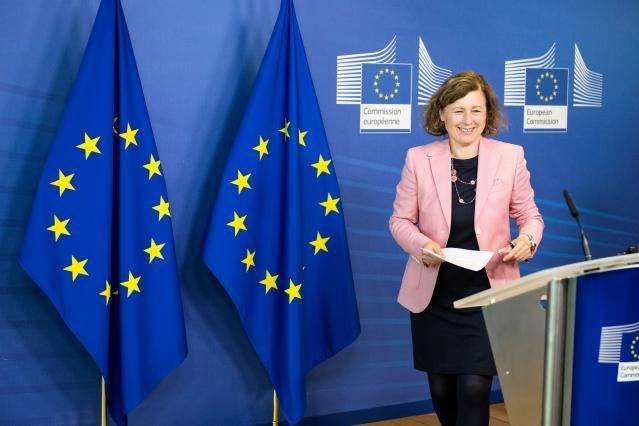
Commission VP for Values and Transparency Věra Jourová arrives at the press conference after meeting the signatories of the Code of Practice on Disinformation, Monday, June 5th.
Brussels will take every opportunity to scrutinize Twitter’s actions and compliance with EU law “vigorously” after the company chose to reject its recommended anti-disinformation measures, European Commission Vice President for Values and Transparency Věra Jourová said in a press briefing on Monday, June 5th, after meeting other tech companies who chose to subscribe to the EU’s voluntary disinformation pact.
As we reported Monday, the meeting took place between the commissioner and the representatives of 44 companies and organizations—including most of the big names in Silicon Valley, such as Microsoft, Google, Meta, as well as the Chinese tech giant TikTok—that have all adopted the EU’s Code of Practice on Disinformation, a set of voluntary commitments to cooperate with Brussels in its effort to tackle harmful and intentionally misleading content on social media.
During this first meeting, Jourová asked the companies to ramp up their fact-checking practices to combat foreign (especially Russian) disinformation, as well as to implement measures to restrict the use of artificial intelligence in the creation and proliferation of disinformation, such as introducing systems that would label AI-generated text and graphics as such.
Only Twitter was missing from the meeting, as the company chose to withdraw from the pact last month, which prompted mixed responses from the political community. While some on the right praised Twitter for taking a stand for free speech, the European Commission began threatening it right away. “You can run but you can’t hide,” Internal Market Commissioner Thierry Breton tweeted in response, adding that these “voluntary” measures will become legal obligations under the new Digital Services Act anyway starting from late August.
Evidently, Jurová could not walk past the elephant in the room without a few choice words aimed at Twitter and Elon Musk for what’s in store for them. As the commissioner said:
We believe this is a mistake of Twitter. [It] has chosen the hard way, they chose confrontation. This was noticed very much in the Commission.
I know the Code is voluntary. But make no mistake: by leaving the Code, Twitter attracted a lot of attention and its actions and compliance with EU law will be scrutinized vigorously and urgently.
With respect to the upcoming Digital Services Act (DSA), she also reiterated Breton’s earlier point, saying that the Code is not only the “right thing to do” but also meant to help companies prepare for the DSA, under which most of these commitments will be enforceable law anyway.
“If [Twitter] wants to operate and make money on [the] European market, they have to comply with the Digital Services Act,” the commissioner said, promising thorough enforcement after August, especially in the case of “illegal content.”
On a more personal note, Jourová appeared to issue another warning directly at Twitter CEO Elon Musk, as the self-proclaimed “free-speech absolutist” has been in the crosshairs of Brussels ever since he took over the platform last year.
“I also want to come back and appreciate the cooperation with the formal people working in Twitter,” the commissioner said, pointing out previous successes in curbing both disinformation and hate speech. Talking about the recent change of leadership, she said the EU was sorry about it, adding that “Twitter had very knowledgeable and determined people, who understood that there must be much-increased responsibility from the side of platforms like Twitter.”
Lastly, while talking about what would happen if Twitter’s efforts were deemed insufficient in compliance with the DSA, Jourová gleefully added:
Of course, it would be sexy if I say that, in September this year, Twitter will get a sanction of 6% of [its] annual turnover… Forget it, I didn’t say that, because of course, I cannot predict [it].
